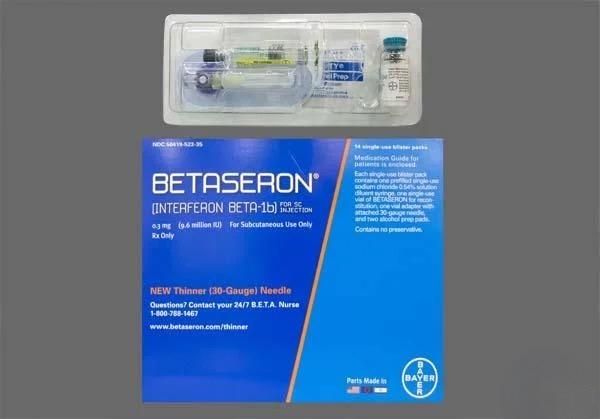Interferon Beta-1B Dosage
Medically reviewed by Drugs.com. Last updated on Oct 25, 2024.
Applies to the following strengths: 0.3 mg
Usual Adult Dose for:
Additional dosage information:
Usual Adult Dose for Multiple Sclerosis
Initial dose: 0.0625 mg subcutaneously every other day, and increased (in 25% increments) every 2 weeks, over a 6 week period, to maintenance dose
Maintenance dose: 0.25 mg subcutaneously every other day
Schedule for dose titration:
Weeks 1 and 2: 0.0625 mg subcutaneously every other day (25% of recommended dose)
Weeks 3 and 4: 0.125 mg subcutaneously every other day (50% of recommended dose)
Weeks 5 and 6: 0.1875 mg subcutaneously every other day (75% of recommended dose)
Week 7 and beyond: 0.25 mg subcutaneously every other day (100% of recommended dose)
Use: For the treatment of relapsing forms of multiple sclerosis to reduce the frequency of clinical exacerbations. Patients with multiple sclerosis in whom efficacy has been demonstrated include patients who have experienced a first clinical episode and have MRI features consistent with multiple sclerosis.
Renal Dose Adjustments
Data not available
Liver Dose Adjustments
- Data not available
- If serum transaminase levels significantly increase or are associated with clinical symptoms (e.g., jaundice) during treatment, consider discontinuing therapy.
Precautions
Safety and efficacy have not been established in patients younger than 18 years.
Consult WARNINGS section for additional precautions.
Dialysis
Data not available
Other Comments
Administration advice:
- Pretreatment with analgesics and/or antipyretics on treatment days may ameliorate flu-like symptoms. Oral low dose steroids at the start of therapy lessen the incidence and severity of flu-like symptoms for the first 2 weeks of treatment.
- The first injection should be done under supervision of a qualified healthcare professional. Train patients or caregivers who will administer the drug in the proper technique and assess their ability to inject subcutaneously to ensure proper administration.
- Visually inspect reconstituted solution before use; discard if it contains particulate matter or is discolored.
- Keeping the syringe and vial adapter in place, turn the assembly over so that the vial is on top. Withdraw the proper dose. Remove the vial from the vial adapter before injecting.
- Use safe disposal procedures for needles and syringes; do not reuse needles or syringes.
- Rotate subcutaneous injection sites to reduce the risk of severe injection site reactions, including necrosis or localized infection.
- A missed dose should be taken as soon as the patient remembers or is able to take it. This drug should not be taken on 2 consecutive days. The next injection should be taken about 48 hours after that dose. Patients taking more than the prescribed dose, or taking it on 2 consecutive days, should be advised to contact their healthcare provider at once.
Storage requirements:
Refer to the manufacturer product information.
Reconstitution/preparation techniques:
Refer to the manufacturer product information.
Monitoring:
- Cardiovascular: Worsening cardiac symptoms in patients with congestive heart failure (at the start of and during therapy).
- Hematologic: Complete blood and differential white blood cell counts and platelet counts at regular intervals (1, 3, and 6 months) following start of therapy, then periodically thereafter if no clinical symptoms (more intensive monitoring in patients with myelosuppression).
- Hepatic: Liver function tests at regular intervals (1, 3, and 6 months) following start of therapy, then periodically thereafter if no clinical symptoms; signs and symptoms of hepatic injury.
- Metabolic: Blood chemistries at regular intervals (1, 3, and 6 months) following start of therapy, then periodically thereafter if no clinical symptoms.
More about interferon beta-1b
- Check interactions
- Compare alternatives
- Reviews (9)
- Side effects
- During pregnancy
- Drug class: interferons
- En español
Patient resources
Other brands
Professional resources
Other brands
Related treatment guides
See also:
Further information
Always consult your healthcare provider to ensure the information displayed on this page applies to your personal circumstances.


